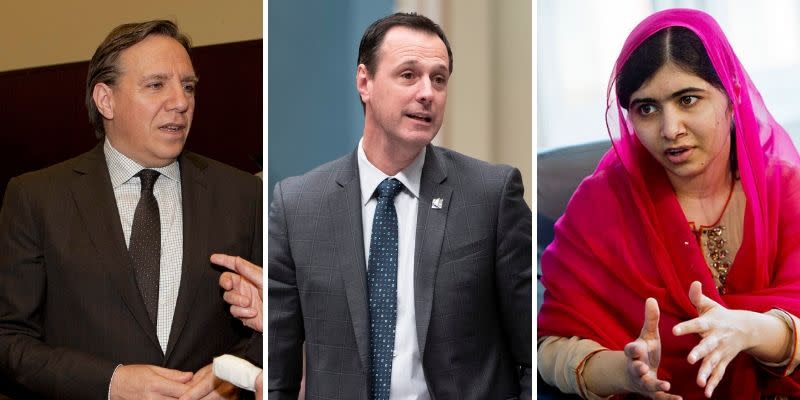VOTE: Rigid or righteous, what is your take on Quebec's religious symbols law?

The raising of a hypothetical question this week has briefly placed Quebec’s premier, its education minister and its religious symbols law under a microscope, and Canadians are divided in their feelings.
It began with a tweet. Quebec Education Minister Jean-François Roberge shared a photo of himself with Nobel Prize laureate and female education activist Malala Yousafzai to Twitter on July 5 with the caption that said it was nice to meet her and discuss access to education.
Reporter Salim Nadim Valji was quick to challenge Roberge for sharing the photo, since Roberge supported Bill 21, a new law in Quebec that prohibits teachers, police officers, judges and all public sector workers from wearing religious symbols on the job.
“Mr. Roberge, how would you respond if Mme Yousafzai wanted to become a teacher in Quebec?” Nadim Valji asked Roberge over Twitter.
Mr. Roberge, how would you respond if Mme Yousafzai wanted to become a teacher in Quebec?
— Salim Nadim Valji (@salimvalji) July 5, 2019
Yousafzai, now 21, gained recognition as a child for speaking out against the Taliban occupation of Pakistan’s Swat district, where she lived with her family.
In 2012, at 15, she was shot in the head by a Taliban gunman in an assassination attempt in retaliation for her activism.
She survived, recovered and has since worked as an advocate for the right to education, especially for females, in her native Northwest Pakistan and around the world.
She also practices Sunni Islam and wears head scarf over her hair.
To Nadim Valji’s question, Roberge responded that it would be an honour if Yousafzai wanted to teach in Quebec, but like in other “open and tolerant countries, teachers can’t wear religious symbols while they exercise their functions.”
Je lui dirais certainement que ce serait un immense honneur et qu’au Québec, comme c’est le cas en France (où nous sommes actuellement) et dans d’autres pays ouverts et tolérants, les enseignants ne peuvent pas porter de signes religieux dans l’exercice de leurs fonctions. #ÉduQc https://t.co/LEWztEU0ul
— Jean-F. Roberge (@jfrobergeQc) July 5, 2019
Quebec Premier François Legault has since defended Roberge’s position, claiming that the matters of Yousafzai teaching in Quebec and Quebec’s religious symbols law are separate subjects being mistakenly labelled as one subject.
“Malala did a lot of work to make sure that young girls can have access to different schools in different countries,” Legault said in an interview with Radio-Canada reporter Sébastien Bovet. “Right now, the second subject is about who can teach those children.”
When Bovet asked Legault if that meant Quebec would reject an esteemed human rights activist like Yousafzai over her head covering, Legault responded that while he doesn’t believe people who wear religious symbols are bad people, secularism is highly valued in Quebec.
“She can teach in Quebec if she accepts to remove a religious sign,” he said. “That’s the decision we took, and it’s supported by the vast majority of Quebecers.”
Many Canadians from different religious and ethnic backgrounds have since made it clear, however, that they disagree with Legault and Roberge.
One Twitter user called it absurd to tell someone who survived an assassination attempt over her beliefs what to wear on her head.
Imagine telling the girl who stood up to and was shot by the Taliban what to wear. https://t.co/luFHAckjVu
— Bridget Phetasy (@BridgetPhetasy) July 6, 2019
I would allow faith and religious practices of each individual to carry them along with him/her. That makes us Free Citizen of Canada, Sikhs are allowed to wear Turbans, why a Muslim lady is not allowed to practice her values and carry her Ego and individuality ????
— Syed Haider (@syediqbalhaider) July 9, 2019
The irony is as an #atheist I have no problems w people having or expressing their religion, as long as you don’t expect me to take on your religion. #Quebec is less accepting of religion than many atheists are 🙄
— Bunting Girl (@Bunting_Girl) July 6, 2019
Others participating in the conversation online support Legault and Roberge, arguing that the law should apply equally to everyone no matter their status, or that it’s not unreasonable to ask someone from outside of Quebec to adhere to its laws, even if they prevent religious expression.
The law is applied equally. If you’ve won an award or you’re getting you’re first job. Doesn’t favor/inhibit religion, it’s applied equally to all. Why would you think because she won some award she should be treated differently? No one cares if you think she’s special.
— EDINFL (@toosacrosanct) July 7, 2019
Religion is personal something you practice at home or church, mosque, etc. When we travel to foreign countries, we have to follow their laws and culture to not offend them. Why can this be true for Quebec and Canada? We're definitely more opened than some theocratic countries.
— Marc (@Marc076899) July 8, 2019
It’s not a hijab it’s a sari and she takes it off in public when she pleases. She is a reasonable woman and I am sure she would follow the society’s rules. pic.twitter.com/mlXXrdiHrq
— Suzie Tighe (@SuzieTighe) July 6, 2019
What do you think? Is Quebec’s religious symbols law too rigid and prohibitive, or should people accept it and move on? Let us know by responding to the poll above, or have your say in the comments section.


